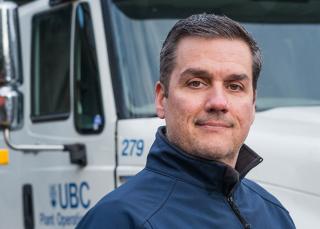Winter is coming


If the approach of winter weather has you cringing at the thought of hours spent shovelling heavy snow off your walkway and scraping ice off your windshield, spare a thought for the Building Operations and Facilities Management staff at UBC. While you may only now be thinking about pulling your snow shovel out of storage, these staff have been planning for weeks for any winter weather event that may strike the campuses.
“We really never stop thinking about it,” says Derek Mahoney, Manager of Landscape and Contract Services, in Facilities Management at UBC Okanagan. “We’ve always got winter on our minds. As soon as the season is over we do a debrief, and then we’ve got a laundry list of things that we want to change for next year that we work on throughout the year.”
Having roads and sidewalks cleared, as well as maintaining open pathways to buildings, doesn’t just keep the university running—it also ensures the safety of faculty, staff, students, and visitors.
“The teams that are focused on snow removal are incredibly dedicated and hardworking, and they always put the campus safety first,” says Derek. “They don’t rely upon a call-out to get out of bed at 4:30 in the morning to come and clear the campus—they’re checking it themselves because they can’t sleep. They’re coming to campus early so that people who arrive for normal office hours can get where they need to go safely.”
On the Vancouver campus, preparations for this year’s winter have been underway for a while, with the Building Operations group getting their vehicles equipped for whatever Mother Nature may decide to throw at them. “In October, we sat down and said, ‘Okay, winter is coming,’” says Tamas Weidner, former Manager of the Building Operations Labour Division, who is now responsible for Waste Management and the Garage.
A university fleet of six ATVs (all-terrain vehicles) get outfitted with plows and salters, while another two get equipped with briners that spray a mixture of water and salt. Even the ride-on mowers get armed with plows to enable them to clear sidewalks. The roads and pathways on campus are cleared according to a priority map that ensures important thoroughfares are maintained, and that buildings requiring wheelchair accessibility are clear of obstructions. That map is publicly available on the Building Operations website so that faculty, staff, students, and visitors can plan ahead.

To ensure the campus isn’t caught off-guard with a surprise storm, the Building Operations team gets weather updates twice a day. That weather service has been in place for about two years—ever since the infamous winter of 2016-17, which still looms large in Tamas and Derek’s minds. “It was a horrible winter,” says Tamas with a shudder. “We had a deep freeze for several weeks. It was very tough. One of the challenges with snow and ice removal is if you have a snowfall that is coming down and doesn’t stop, you can keep plowing the same road over and over and it’ll get covered up. It’s the same thing with sidewalks. I mean, you can plow a sidewalk but if it continues to snow you go back two hours later and it will look like you haven’t done anything.”
It was so bad, recalls Tamas, that when buses stopped coming all the way to campus, he personally drove a truck to pick up members of his team from the bottom of the hill at Alma and Broadway. Not only that, but some staff ended up staying the night on campus. “We actually rented some hotel rooms here on campus over at student housing. We knew we were going to have to do an early start the next day, and we wanted to make sure people got a good rest between shifts.”
In the Okanagan, says Derek, “even the news organizations called it Snowmaggedon. Our snow piles became so big that we had to bring in multiple dump trucks to move the snow piles to a different part of the campus. It was one of those non-stop three- or four-day continuous snow events, and the guys were just going non-stop.”

Despite the challenges of that year, says Tamas, some good came of it. “We learned a lot from that winter. We made some changes to how we allocate sidewalks and roads, and the hand-clearing for accessibility, and we noticed huge changes.” While all of the snow and ice removal used to be managed by the Building Operations Labour Division, it is now a coordinated approach across the Municipal Services branch. The labour group takes on the roads and the handwork of clearing of building pathways and accessibility routes on the south side of campus, while the landscape group takes the sidewalks and the handwork on the north side.
Critical to keeping things on track is the UBC garage. “Any time we need to stay late or start early, we need somebody from the garage to come in as well,” notes Tamas. “When you’re plowing and salting, it’s a lot of force on the equipment. Chains break and hydraulics break constantly. The mechanics play a huge role.”
With the crews pulling long days that often start at 5am, both Tamas and Derek agree that notes of appreciation from university colleagues are a great morale-booster. “We always post those notes in our shop so the crews can see it, or we read out the emails during meetings: ‘Hey, someone from the math department said thanks for doing a great job.’ That goes a huge way,” says Tamas.
In addition to the work of clearing the roads and footpaths, Derek notes that the custodial staff also have added challenges to deal with during the winter months. “There’s a lot of sand and anti-ice chemical [calcium chloride brine] that gets tracked into the building that floors don’t appreciate, he says. “It’s a big job to clear those entrance mats and capture a lot of sand and water from the snow melting off people’s boots. It definitely impacts everybody.”
As intense and stressful as it is, there’s something about everyone pulling together that Tamas can’t help but anticipate with some excitement. “At the end of the day, I think we all kind of look forward to it,” he says. “I know it sounds crazy, but it feels like we’re really making a difference.”
At the end of the day, I think we all kind of look forward to it. I know it sounds crazy, but it feels like we’re really making a difference.
Find the latest news, updates, events, and useful dates from across UBC, curated for faculty and staff by Internal Communications.
Access a library of resources from multiple UBC websites, all in one place.